
The number one and two bestselling books in Christian bookstores today are by a man who denies salvation by faith in Christ and preaches that God's ultimate plan for you is to be rich and successful in this life. Number eight on the list is by a man who indicates that God is a "risk taker" who doesn't know what the ultimate outcome of His creation will be.
I don't know which is sadder; that these guys actually teach this junk, or that millions of Christians who will buy these books for Christmas this year do not know any better.
It's not "cool" to talk about theology anymore. It's even less cool to learn about it. But if Christians today want the church in America to be credible in the days of our grandkids, it's time that we start paying a little more attention to theology; it's something every Christian should know.
Think of theology as the frame of a house. Unless you're used to looking at unfinished homes, it's not always very exciting to look at the framework of a house. It's more fun to look at decorations - paint colors, carpet, and light fixtures, but you put your life in danger when you attempt to hang pictures on walls that won't stand up. Before you begin elaborating on the walls, they have to be supported. And tragically, many of the best selling Christian books today try to add decorations to your life that aren't supported by the beams of theology
There are ten aspects to the framework of the Christian faith that every Christian ought to understand in a basic way. We don't need to know everything, but enough that our walls are stable. That way, when decorators attempt to remodel our house, we know the limits of what the beams can stand. Understanding theology gives us the ability to safely make our faith personal without the danger of knocking down a support wall unintentionally. Basically, theology gives us the limits of what we can and cannot say about the most important things in Christianity.
The ten areas with which we should all be familiar are:
1. Theology Proper - This is the study of God and His attributes. Why is it wrong or a popular men's book to imply that God is a risk taker who doesn't know the outcome of His creation? Because Scripture tells us that God is sovereign, and knows
all things. To say He'll be surprised by the outcome of creation means we have no future hope because God is not in control.
2. Christology - Who is Jesus Christ? The DaVinci Code was an extraordinarily popular book that threatened to shipwreck a lot of Christians. How would it affect our faith if Jesus
had married and fathered children? That's a Christology question.
3. Pneumatology - The term sounds impressive, but pneumatology is the study of the Holy Spirit. When a prominent Houston pastor brags about his lack of formal training for ministry by pointing to a time in his life where he "got the Holy Ghost," what is he saying about the work of the Holy Spirit? Why is he wrong?
4. Bibliology - As I'm writing this, there is an impressive commercial on TV that promises to send you "another testament" of Jesus Christ for free in the mail. Could there be another testament to the Bible that we don't know about? How much should we trust the Bible?
5. Eschatology - Several years ago, a man published a book called "88 Reasons Jesus Christ will Return in 1988." In 1999, I drove by a church in Tulsa that was having "Rapture Practice" on Wednesday night after the service. What exactly should we expect in the future? What does the Bible indicate? And how should we live as a result? These are questions of Eschatology, the study of last things.
6. Angelology - Not long ago there was a Dallas police officer who was killed in the line of duty. They interviewed his wife on the news, and she thanked God that her husband was now her guardian angel, and would be with her for the rest of her life. On the flip side, I received a lot of questions from the teenagers I worked with about the movie "The Exorcism of Emily Rose." Could that happen to me? What exactly
are angels and demons? How do they behave?
7. Anthropology - The pastor with the bestselling Christian book on the market right now believes that man is good for the most part, and only needs to unlock his inner potential to do great things for God. This is an anthropology question. In addition, the entire Pro-Life debate revolves around anthropology. Why should we protect the lives of the unborn and the mentally handicapped?
8. Hamartiology - Not to pick on him too much, but that very same pastor in Houston doesn't like to say the word "sin." He prefers "mistake," or "fault." What is sin? Can I ever stop sinning? Why do I sin in the first place, and how does it effect me?
9. Ecclesiology - How should the church function? Who should be in charge? Who do we include in the church and why do we include them? A lot of the "emergent" debate that you'll be hearing more about in the future deals with ecclesiology issues (among others). Why does the church exist, and how should it conduct itself?
10. Soteriology - Christians talk a lot about our need to be saved. Saved from what? How is a person saved? There are a lot of splinter issues in this area that are relatively hot topics right now. It's important for us to understand salvation so we don't get caught up in the debate without understanding the issue.
Fortunately, it's not difficult to begin reinforcing the walls of the house. A small committment over an extended period of time can do wonders for the strength of your framework.
When I got to college, I was a glutton for punishment. I grew up in a great Christian home, but in a church that did not major in building a framework for their members, especially the youth. (Most churches aren't good at this). Consequently, when I set foot on the campus of Oklahoma State University, I was like most college students: a sitting duck. Cults love college campuses because the students know what they believe, but don't know why they believe it; they have decorations on the wall, but the walls aren't reinforced. So cults are able to swoop in, add their own reinforcment to the students' beliefs, and jimmy-rig what the church left off.
Fortunately, a couple of Christian guys took me under their wing, and challenged me to reinforce my walls. So every day, I read a section of
Basic Theology by Charles Ryrie, and began the process of understanding why I believed what I believed - reinforcing my house. And it's a process I've never regretted.
Ryrie's resource is a good one for a beginner, primarily because it's concise and paints with a broad brush. You won't get bogged down in the details, but will get a broad explanation of Christian Theology and the biblical passages that support Ryrie's conclusions. Millard Erickson also wrote a decent book on theology called
Christian Theology. It's a little more heady than Ryrie's book, but also provides a little more depth than Ryrie for the person with a little theological knowledge already under their belt. Finally, I found the
Moody Handbook of Theology extremely helpful as a beginning reader. It's extremely reader-friendly, and contains helpful explanations, but often doesn't discuss the alternative views to an issue, so the reader isn't exposed to the arguments of other positions.
Wherever you start, start. And never believe anything just because the book says it. Test it against your framework, which ultimately has to be rooted in the Bible. This will be on the test - every time you read a Christian book with hopes of improving your Christian life. Does the advice of the decorator stand up to the test of Theology? Or is his advice going to make the walls fall down?
 Kari and I finally took a break from unpacking boxes Wednesday night and went to see "The Chronicles of Narnia, The Lion, The Witch, and The Wardrobe." First, I should tell you that I'm not in to fantasy-type movies and books. The Lord of the Rings movies turned into a $10 nap - they just don't do anything for me. But I wanted to support the Chronicles of Narnia because of its family-friendly value and the message behind the story.
Kari and I finally took a break from unpacking boxes Wednesday night and went to see "The Chronicles of Narnia, The Lion, The Witch, and The Wardrobe." First, I should tell you that I'm not in to fantasy-type movies and books. The Lord of the Rings movies turned into a $10 nap - they just don't do anything for me. But I wanted to support the Chronicles of Narnia because of its family-friendly value and the message behind the story.


























